|
|
|
Sort Order |
|
|
|
Items / Page
|
|
|
|
|
|
|
| Srl | Item |
| 1 |
ID:
105177
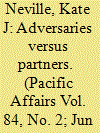

|
|
|
|
|
| Publication |
2011.
|
| Summary/Abstract |
n the Philippines, skepticism about private sector participation in urban water provision became increasingly pronounced as missed service targets and regulatory battles plagued governmental relations with the two companies (Manila Water and Maynilad) granted concessions for water provision in the capital, Manila. A comparative study of these two public-private partnerships (PPPs) reveals the challenges of reconciling bureaucratic and organizational dynamics with public suspicion of the private sector. This study draws on interviews and observations with corporate and government officials, academics, journalists, non-governmental organizations and civil society members in the Philippines, almost a decade after the initial privatization.
This paper furthers our understanding of the outcomes in Manila-and PPPs more generally-by addressing the tension between credible commitment in contractual arrangements and flexibility for responding to economic and environmental shocks. It argues that adversarial interactions between the private corporations and regulators hindered the collaborative negotiations needed to respond to the currency crisis. Fear of public backlash against price increases and contract adjustments prevented the government and companies from engaging in meaningful joint problem solving.
The differential outcomes of the companies illustrate the relevance of specific contractual arrangements and leadership in determining the impact of unforeseen shocks. However, the problems experienced by both companies indicates the need-if the private sector is to equitably and efficiently provide public goods-to redesign PPPs to increase transparency and to develop true partnerships.
|
|
|
|
|
|
|
|
|
|
|
|
|
|
|
|
| 2 |
ID:
095336
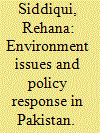

|
|
|
| 3 |
ID:
133158
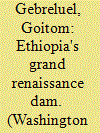

|
|
|
|
|
| Publication |
2014.
|
| Summary/Abstract |
Ethiopia surprised northeastern Africa in 2011 by announcing its plan to construct the first hydroelectric dam on the Blue Nile. With an annual production capacity of 6,000 megawatts, the Grand Ethiopian Renaissance Dam (GERD) is set to become the largest hydroelectric power plant in Africa. Expected to be completed by 2015, the dam will not only break Egypt's millennia-long monopoly over the Nile waters, but will also, according to Cairo, threaten its water supply. The Nile is Egypt's only major source of freshwater and has served as the lifeline of the nation since the dawn of its civilization.
|
|
|
|
|
|
|
|
|
|
|
|
|
|
|
|
| 4 |
ID:
041897
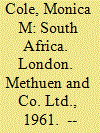

|
|
|
|
|
| Publication |
London, Methuen and co. ltd., 1961.
|
| Description |
xxx, 706p.Hbk
|
|
|
|
|
|
|
|
|
|
|
|
Copies: C:1/I:0,R:0,Q:0
Circulation
| Accession# | Call# | Current Location | Status | Policy | Location |
| 000642 | 916.8/COL 000642 | Main | On Shelf | General | |
|
|
|
|
| 5 |
ID:
074911
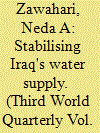

|
|
|
|
|
| Publication |
2006.
|
| Summary/Abstract |
The future stability of the young and relatively weak Iraqi government rests on its ability to provide basic public goods—water, food, and electricity—to its populace, which is related directly to stabilising the quality and quantity of its available water supply. Since 98% of Iraq's water comes from the Euphrates and Tigris rivers, both of which originate and flow through several countries before entering Iraq, stabilising the water supply becomes an international issue. In other words, to stabilise Iraq's water supply, there needs to be a comprehensive agreement between the states sharing the Euphrates and Tigris. As this article argues, an agreement is possible when states have an interest in co-operation, a neutral mediator facilitates the negotiations, and a river commission is established to maintain long-term co-operation. Due to important changes today the states sharing the Euphrates and Tigris rivers confront favourable conditions that can lead to an agreement.
|
|
|
|
|
|
|
|
|
|
|
|
|
|
|
|
| 6 |
ID:
125261
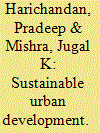

|
|
|
|
|
| Publication |
2013.
|
| Summary/Abstract |
Sustainability, in a broad sense, is the capacity to endure. Sustainable development means attaining a balance between environmental protection and economic development and between the present and future needs. It means equity in development and sectoral actions across space and time. resources.
|
|
|
|
|
|
|
|
|
|
|
|
|
|
|
|
| 7 |
ID:
133355


|
|
|
|
|
| Publication |
2014.
|
| Summary/Abstract |
Imagine a city that requires 1,000 million gallons of water every day and then imagine a system that, even in the best case scenario, can carry only half of that water to the city. It is inevitable that dishonest officials, unscrupulous elements, profiteers and even crime rackets see this shortage as a window of opportunity to make a quick buck. Quite naturally, those vested in its failure would like to keep the system as inadequate and inefficient as it always has been. This is Karachi and a summary of its water woes for you.
|
|
|
|
|
|
|
|
|
|
|
|
|
|
|
|
| 8 |
ID:
133356
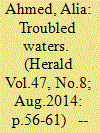

|
|
|
|
|
| Summary/Abstract |
One April day in 2013, six artists got together and envisioned Karachi as they would like to see it, in place of the crumbling, violent megacity at their doorstep. Months later, in November, the team brought to their city a three-day explosion of street art, theatre, discussions, documentary screenings, exhibitions and live music under the the Pursukoon Karachi Festival. For a lasting effect, the festival launched its ultimate undertaking - renovating the Karachi Cantonment Railway Station.
|
|
|
|
|
|
|
|
|
|
|
|
|
|
|
|
| 9 |
ID:
133357
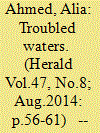

|
|
|
|
|
| Publication |
2014.
|
| Summary/Abstract |
One April day in 2013, six artists got together and envisioned Karachi as they would like to see it, in place of the crumbling, violent megacity at their doorstep. Months later, in November, the team brought to their city a three-day explosion of street art, theatre, discussions, documentary screenings, exhibitions and live music under the the Pursukoon Karachi Festival. For a lasting effect, the festival launched its ultimate undertaking - renovating the Karachi Cantonment Railway Station.
|
|
|
|
|
|
|
|
|
|
|
|
|
|
|
|
| 10 |
ID:
157019
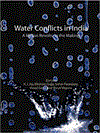

|
|
|
|
|
| Publication |
Oxon, Routledge, 2008.
|
| Description |
xxxii, 441p.hbk
|
| Standard Number |
9781138564732
|
|
|
|
|
|
|
|
|
|
|
|
Copies: C:1/I:0,R:0,Q:0
Circulation
| Accession# | Call# | Current Location | Status | Policy | Location |
| 059268 | 333.91/JOY 059268 | Main | On Shelf | General | |
|
|
|
|
| 11 |
ID:
101174
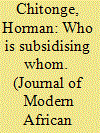

|
|
|
|
|
| Publication |
2010.
|
| Summary/Abstract |
This paper looks at the policy and practice of cross-subsidisation in the water sector, focusing on the Zambian experience. Setting a price for water services is a sensitive and controversial issue. Pricing water services below cost recovery can threaten the sustainability of the service and human welfare in the long term, while water pricing at full cost recovery often restricts access to water services for poor households, compromising their well-being. This paper looks at one of the approaches that policy makers use in an attempt to balance the trade-offs - cross-subsidisation. Lessons from the experience of implementing the cross-subsidy policy in Zambia are identified and discussed. This paper argues that while the objectives behind the cross-subsidisation policy are clear, the results from the implementation of this policy are, at best, unclear. The Zambian experience shows that for an indirect subsidy, such as cross-subsidisation (as opposed to a direct subsidy), to generate positive results, a careful consideration of the actual context in which the policy is to be implemented must be a precondition to its implementation.
|
|
|
|
|
|
|
|
|
|
|
|
|
|
|
|
|
|
|
|
|